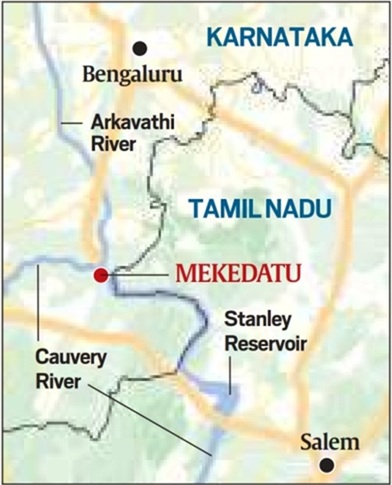(Preliminary Exam: Current Affairs)
(Main Exam, General Studies Paper 2: Functions and Responsibilities of the Union and States, Issues and Challenges Related to the Federal Structure) |
Context
The Karnataka government recently decided to submit a revised Detailed Project Report (DPR) for the Mekedatu Reservoir Project to the Central Government. The Supreme Court dismissed the challenge petition filed by the Tamil Nadu government as "inconsistent," paving the way for a preliminary investigation of the project. This issue is deeply intertwined with the Cauvery River water-distribution dispute.

What is the Mekedatu Project?
- The Karnataka state government wants to build a 'balancing reservoir' at Mekedatu at a cost of ₹9,000 crore.
- A balancing reservoir is a storage tank that regulates the flow of water into water distribution systems.
- This reservoir will store 67.16 TMC of water and will also have the capacity to generate approximately 400 MW of hydropower.
- The project will submerge approximately 4,996 hectares of land, including 4,800 hectares of forestland.
- The project is expected to help meet the growing drinking water demand in Bengaluru.
- The idea was mooted in 1948, but the project has gained momentum in recent years due to water shortages in Bengaluru.
Cause of Dispute
- The historical background of the Cauvery River water dispute has created distrust between the two states.
- Tamil Nadu alleges that Karnataka often does not release the stipulated amount of water between June and September.
- Tamil Nadu fears that after the dam is built, Karnataka will hold back excess water and release it as per its convenience.
- Karnataka says the project will help it utilize the 4.75 TMC of additional water awarded by the Supreme Court and also make it easier to supply the agreed amount of water to Tamil Nadu.
Importance of the Project
- Bengaluru faced a severe water crisis in 2024.
- The city needed 2,600 megaliters per day (MLD) of water, while only 2,100 MLD was available.
- Currently, Bengaluru receives 1,450 MLD from the Cauvery and 650 MLD from groundwater.
- The city's population is projected to grow from 13 million to 20 million in six years. The water requirement will then increase to 4,000 MLD.
- However, the Supreme Court has only allocated 370 MLD (4.75 TMC) of water for Bengaluru.
Other Options
- Experts from the Indian Institute of Science, T.V. Ramachandra says that Bengaluru receives 700–850 mm of annual rainfall, which could provide approximately 15 TMC of water.
- Recycled water could provide an additional 16 TMC. Thus, solutions to the water crisis are also possible through other means.
Central Government's Stand
- Karnataka submitted the DPR to the Central Water Commission (CWC) in 2019.
- The Environment Ministry's expert committee stated that this is an inter-state matter, requiring an amicable solution between the two states.
- In February 2024, the CWMA, after discussing the project, returned it to the CWC for further scrutiny.
Conclusion
The Mekedatu Dam project is not merely a matter of reservoir construction but a sensitive part of the decades-old Cauvery water distribution dispute. While Karnataka is supporting it, considering Bengaluru's future water needs, Tamil Nadu fears that it will increase water storage capacity and impact its share. Ultimately, the resolution of this dispute is possible only through trust, transparency between the two states and mediation by the Centre.



